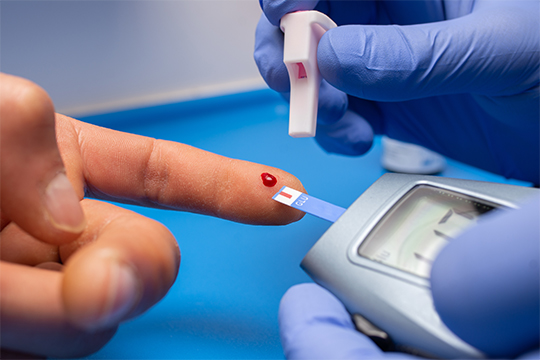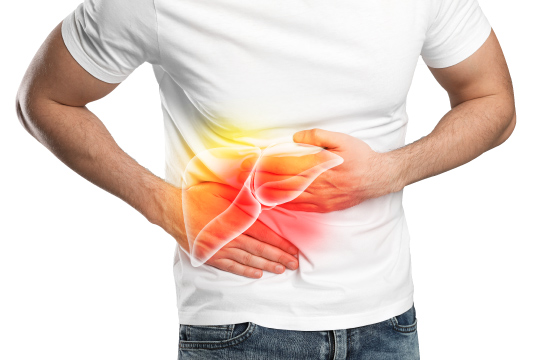Home > Disease and Treatments > Gastroesophageal reflux disease (GERD)- Causes, symptoms, and treatments
Gastroesophageal reflux disease (GERD)- Causes, symptoms, and treatments
Gastroesophageal Reflux Disease (GERD) is a digestive disorder caused by an excess of acidic stomach juices or food and liquids backing up from the stomach into the esophagus. There are people of all ages who suffer from GERD—infants as well as older adults.
GERD is more likely to develop in people with asthma. During asthma flare-ups, the lower esophageal sphincter relaxes, allowing stomach contents to reflux into the esophagus. Reflux symptoms may be worsened by some asthma medications (especially theophylline).
The irritation of the airways and lungs caused by acid reflux can make asthma symptoms worse. A progressive worsening of asthma can result from this. In addition, this irritation can trigger allergic reactions and increase sensitivity to things like smoke and cold air.
Gastroesophageal Reflex Disease Symptoms
The symptoms of gastroesophageal reflux disease are familiar to everyone. This occurs when you burp, have an acid taste in your mouth, or have heartburn. If these symptoms interfere with your daily life, you should seek medical attention.
You can also experience the following symptoms if you have GERD:
- Acid regurgitation (Acidic taste or fluid in the throat)
- Heartburn: A burning sensation in the chest.
- Chest pain: May mimic a heart attack.
- Difficulty swallowing: Due to esophageal irritation.
- Excessive salivation
- Throat soreness
- Hoarseness or laryngitis
- Inflammation of the gums
- Cavities
- Bad breath
- Chronic coughs
GERD symptoms may be worse:
- During the night or while lying down.
- When you have just eaten a large or fattening meal.
- After bending over.
- After smoking or drinking alcohol
Causes of GERD:
Weak lower esophageal sphincter (LES): Allows acid to flow back.
Hiatal hernia. In a hiatal hernia, the top of the stomach bulges up through the hole in your diaphragm where the esophagus passes through. As it squeezes between your esophagus and stomach, it traps acid. This also removes some of the muscular support for your LES, which is located above your diaphragm. Especially as you get older, hiatal hernias are very common. In most cases, they gradually worsen over time.
Obesity. Like pregnancy, obesity increases the pressure and volume in your abdomen, which affects your LES. Moreover, obesity tends to last longer than pregnancy, which weakens the muscles more permanently. A hiatal hernia is commonly caused by this condition. As fat tissue secretes estrogen, having more of it also increases estrogen levels.
Smoking. Smoking relaxes your LES, whether you smoke yourself or are exposed to secondhand smoke. Your LES is also opened by coughing when you smoke. You can develop a hiatal hernia if you smoke and cough chronically. Also, smoking causes your stomach to produce more acid and slows down digestion.
Diagnosis
GERD can be diagnosed with several tests, including:
- Esophageal pH and impedance monitoring: During eating or sleeping, this instrument measures how much acid is present in the esophagus.
- Upper GI endoscope. A tube with a camera attached is used to inspect the esophagus. During a biopsy, a small sample of tissue may also be taken.
- X-ray of the upper GI tract: An X-ray that shows certain physical abnormalities that might lead to GERD.
- Esophageal manometry. In this test, muscles in the esophagus are measured during swallowing. Sphincter strength can be measured with it.
- Bravo wireless esophageal pH monitoring. An esophageal capsule is attached temporarily for this test. For approximately 48 hours, the acidity is continuously measured.
Gastroesophageal Reflux Disease Treatment
Changes in diet and lifestyle to prevent and overcome GERD
GERD symptoms can be reduced by making a few lifestyle changes.
- Eat foods that don’t trigger the LES: Avoid foods that can relax the LES, such as chocolate, peppermint, fatty foods, caffeine, and alcoholic beverages. If you experience symptoms, you should also stay away from citrus fruits and juices, tomato products, and peppers that can irritate the esophageal lining.
- Minimize servings. Eating smaller portions at mealtimes can also help control GERD symptoms. You should also eat two to three hours before bedtime to allow your stomach to partially empty and your stomach’s acid to go down.
- Slow down: Make sure you eat slowly at every meal. When you take a bite, set your fork down to help you remember to chew your food thoroughly. Only pick it up again after you’ve chewed and swallowed it completely.
- Quit smoking. The LES is weakened by smoking cigarettes. Smoking should be stopped to reduce symptoms of GERD.
- Maintain a healthy weight. Overweight often worsens symptoms. Losing weight is often the solution for overweight people.
- Don’t wear tight clothes.: When you wear clothes that squeeze your waist, your belly and lower esophagus are put under pressure.
Medications
Acid production is suppressed by medications used to treat GERD. When treating both erosive and non-erosive GERD, PPIs are considered the most effective treatment. Esophageal linings can be healed by them.
Other options include:
- Antacids: Neutralize stomach acid to provide quick relief.
- H2 Blockers: Reduce acid production.
- Proton Pump Inhibitors (PPIs): Block acid production more effectively.
Surgical options
A gastroenterologist may recommend surgery if lifestyle changes and medications fail to significantly improve GERD symptoms.
Surgical treatments include:
Fundoplication: The surgeon sews the stomach top around the esophagus. Reduces acid reflux by adding pressure to the lower end of the esophagus.
Endoscopic procedures. GERD can be treated with a variety of endoscopic procedures. Among them are endoscopic sewing, which uses stitches to tighten the sphincter muscle, and radiofrequency, which produces small burns to help tighten the sphincter muscle.
Complications
Esophagitis: Inflammation of the esophagus.
Barrett's Esophagus: Precancerous changes in the esophageal lining.
Strictures: Narrowing of the esophagus.
Respiratory problems
Disclaimer
This is general information about the disease and treatment options. Please consult a specialist doctor for the right diagnosis and treatment, which may vary based on each patient. Book an appointment with your specialist to know more.
Medical And Surgical Gastroenterology At Royal Care Hospital
Our Medical and Surgical Gastroenterology department at Royal Care Hospital offers a wide range of advanced services to address GERD. GERD can be effectively managed and overcome by combining lifestyle changes, medical interventions, and personalized care.





